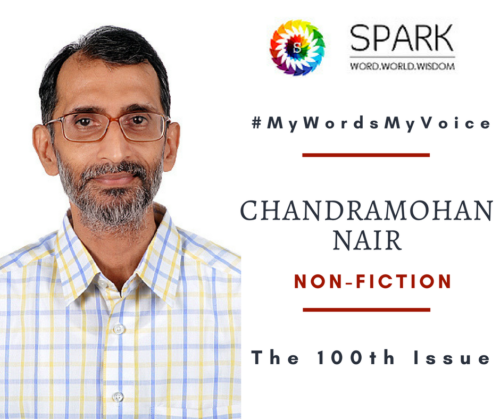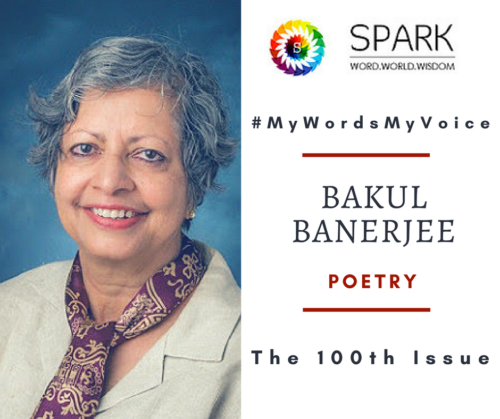by Chandramohan Nair
What theme are you addressing in your piece? Why is this important to you?
Chandramohan Nair: The central theme is that life is a journey – one mostly travelled and endured alone – and every human being seeks the wherewithal to sustain himself/herself in this journey. Given this context, my piece examines the human attributes and a world-view that helped my father cope with the ups and downs of his life and helped him derive some fulfilment in the process. The attributes I have tried to highlight are those of cultivating a passion for a creative art, retaining your childhood curiosity and sense of wonder, developing a sense of humour that allows you to appreciate the lighter side of life, and trying to be kind and considerate in your dealings with others The world-view is based on a belief in an existential philosophy advocating thinking for yourself, making your own choices and taking responsibility for the consequences. This is important to me because I have also been trying to live life based on these principles.
April is the cruellest month in Kerala. The heat, the humidity and the still air make each day an ordeal. Our pretty, little tiled house in Trivandrum had a few coconut trees and a tamarind tree for shade but they made little difference and the house would turn into a furnace by the afternoon.
On one such stifling April afternoon, some forty years ago, we waited impatiently for Amma to serve her delectable lunch which would temporarily take our minds off the heat. The lunch was ready but Acchan was engrossed in reading out excerpts from his favourite play to his childhood friend Pillai Uncle. The play was Samuel Beckett’s Waiting for Godot. Pillai Uncle, in half-slumber, listened with a benevolent smile. We four children wore grouchy expressions, bored out of our minds listening to a story of two tramps and their endless wait for a person named Godot. Thankfully, the aroma of deep-fried mackerel from the kitchen made Acchan abruptly end the reading session and declare that we should break for lunch. A reaction which was partly Pavlovian and partly because Acchan must have realised the irony of making his children wait for lunch much in the manner of Vladimir and Estragon.
Looking back on that afternoon now, and the unusual pre-prandial reading of Beckett, I mused over the eventful life my father had led and the interests and traits he had developed coping with the ups and downs in his long life.
He was born Kesavan Gopalan Nair in 1912 – the year the Titanic sank and two years before the beginning of World War I – in a village near Quilon. A strained financial situation at home along with the lack of employment opportunities made him discontinue his studies soon after his School Finals examinations and try his luck abroad. In early 1930, he boarded the SS Rajula at Madras, paying a deck class fare for the eight-day voyage to Singapore via Nagapattinam and Penang.
He was to stay in Singapore and Malaya for the next twenty-eight years. He learnt shorthand and typing, taught himself English, and worked in a variety of office jobs. He experienced both extreme deprivation and the horrors of war. Two of his young friends, whom he had brought over to Singapore after considerable effort, died soon after they landed – casualties of the initial wave of Japanese bombings of the city in December 1941. The trauma of this event was to make him an atheist for life. Later, he and a few of his friends sought refuge in the Malayan jungles till the end of the war in August 1945, preferring battling leeches and beri-beri to living under the Japanese occupation army.
In 1947, his skills in stenography and English found him a job in the Indian High Commission at Singapore, which then led to his spending the rest of his working career in the External Affairs Ministry with postings in places as diverse as Cairo, Kathmandu, Brussels and finally as Attaché in Khartoum. He settled down in Trivandrum after retirement.
The over-riding passion of his life was English literature and to a lesser extent cinema. That passion had its origin in his visit, accompanying an ailing relative, to a leading vaidyar who resided in a neighbouring village. The vaidyar had a well-stocked library in his consulting room containing English literary works besides medicinal texts. When he noticed my father – who was in high school then – looking at these books with fascination he told him to select a few and return them on his next visit. Thus a stroke of serendipity opened up a treasure trove of literary classics to the young Gopalan.
Years later he would create his own collection starting with Chaucer, Alexander Pope’s Homer and the works of Shakespeare, and then build his collection covering the ages of Milton, Johnson, Wordsworth, Tennyson and Hardy and finally the modern age. In the end, his preference for serious reading appears to have been for just a handful of writers – Jean-Paul Sartre both as a philosopher and writer, T.S. Eliot, Samuel Beckett, Graham Greene and V.S. Naipaul, who was the last major author he read. Possibly, he found solace by being able to relate his own struggles, hardships and view of the world with the themes that ran through the works of these writers – Sartre’s existentialism, the sense of hope amidst the gloom of war in some of Eliot’s later works, the hopelessness and alienation of man in Beckett’s universe, the frailties and dark side of the characters in ‘Greeneland’, and the despair about life in India (but not the disdain for Indians) as depicted by Naipaul. On the lighter side, James Thurber and P.G. Wodehouse were favoured along with the columnist Art Buchwald. In a sense, his literary pursuit saw him progress from a young man’s fascination for the magical and enjoyable world of stories, to a search for life’s meaning in the works of great authors and finally to the dawning of equanimity on discovering a world view that made sense to him.
As a writer, he contributed occasional articles to Singapore newspapers in the 1950s. He also took great pride in securing a diploma from the London School of Journalism while in his fifties. He had the satisfaction, after retirement, of assisting the renowned writer and educator Dr K.M. George in compiling multiple volumes on Comparative and Modern Indian Literature. He must have been disappointed, though, that he was not able to take up writing seriously. For years he laboured on a draft of a novel but never really got down to completing it.
His posting in Europe coincided with the peak of the French New Wave filmmakers such as Jean-Luc Godard and Francois Truffaut, and he was an avid film-goer during his time there. Still, his favourites were the old masters like Akira Kurosawa, Ingmar Bergman and Luis Bunuel. Rashomon, a movie which explored the nature of truth when all humans are essentially unreliable narrators, particularly appealed to him.
The sense of curiosity and wonder that drove his pursuit of literature was also present in his day-to-day activities. A piece of the curious young village boy, always in thrall of the wonders of the world, remained with him. The recreation he loved the most was locating a new place using a minimal number of landmarks and directions. This, combined with his love for walking, made accompanying him on these pursuits a test of endurance. I remember walking for miles as a kid, with Acchan navigating by the sun and intently trying to spot the next landmark which would be anything from a bend in a rivulet to a dilapidated primary school building. He would consider it a failure to ask a passer-by for guidance. Thankfully, if he sensed our spirits were waning we would be allowed to indulge in a nice cold sherbet from a roadside stall.
After retirement, he kept abreast with happenings in the city and around the world by meticulously reading the papers and listening to the radio. In his eighties, especially after my mother passed away, he was prone to long periods of silent contemplation, but he never communicated a sense of despair or being jaded by life.
Although he could get worked up and anxious over little things, he was affable by nature and totally devoid of malice. In large groups, he would often keep his own counsel but amongst family and friends, his skills as a raconteur would have the audience in splits. This used to puzzle me no end as the jokes often appeared innocuous to me but people would never tire of hearing them again and again.
One of his favourites was about how, as a child, I would petrify the lady of the house during our social visits. Apparently, if the snacks that were served did not appeal to me, I would start doing a Pradakshina from the living room to our host’s kitchen and stop only if something more scrumptious was prepared or procured. Personally, I never found this anecdote amusing but I finally figured out that what people enjoyed was not the joke itself but his manner of delivery. His narration would typically be deadpan, with a number of pauses for effect, but his trademark was an abrupt ending followed by long and almost uncontrollable laughter from his side which invariably became contagious. Years later I found that this kind of laughter therapy was being used in stress-busting classes.
Another favourite pastime of his, especially on train journeys, was to trace out our family tree and those of obliging co-passengers to try and find some linkage through a relative or a common friend. This was an often embarrassing experience for us as family disclosures of a sensitive nature were common during this exercise.
To a large measure I believe that his passion for the arts, his sense of humour and curiosity about people and places kept him energised, motivated and composed through his long life.
As his children, we were lucky to imbibe these qualities in varying degrees apart from enjoying his affection as a doting father.
But for all those who interacted with him it was his courteous and kind behaviour that really stood out. His courtesy extended to being meticulous in responding to any letters or requests for advice. He was always generous with his time especially if anyone needed guidance with a literary topic or usage of the English language. His kindness also meant that he was ill-equipped to say no to the occasional request that came his way for financial assistance and my mother had to step in then and take a more considered decision.
Aldous Huxley once said that after pondering the human predicament for his entire life his only prescription was for people to be a little kinder in their interaction with fellow human beings. I think Kesavan Gopalan Nair, the noble soul that he was, would have heartily seconded that. In the end, his ability to remain tolerant and retain a charitable view of life despite all of life’s uncertainties was his greatest legacy.







A very touching piece. Many of us of the same generation as Chandra Mohan can relate to the situation of our parents and their struggles and accomplishments while living their life. A well written piece I must say, Kudos!